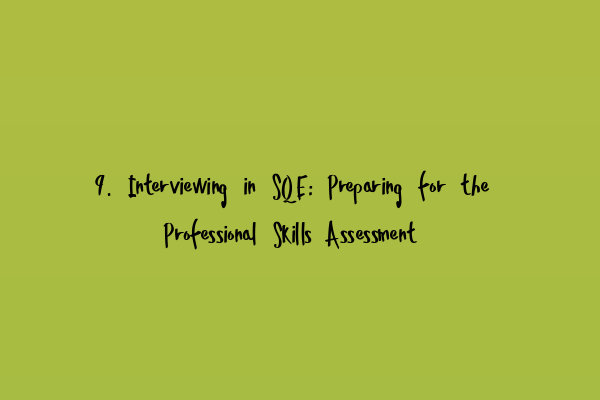9. Interviewing in SQE: Preparing for the Professional Skills Assessment
Interviewing is an essential skill for any aspiring lawyer, and it plays a crucial role in the Professional Skills Assessment (PSA) of the Solicitors Qualifying Exam (SQE). To succeed in your SQE journey, you must master the art of interviewing. In this article, we will explore the key strategies and tips to help you prepare for the interviewing segment of the SQE’s PSA. So, let’s dive in!
1. Understand the Structure of the PSA
Before we delve into the specifics of interviewing, it’s important to have a clear understanding of the structure of the PSA. The PSA consists of several skills assessments, one of which is interviewing. This segment assesses your ability to effectively communicate, ask relevant questions, listen actively, and provide concise and accurate responses.
By familiarizing yourself with the overall structure of the PSA, you can tailor your preparation accordingly and allocate sufficient time to each skill assessment.
2. Develop Strong Interviewing Skills
Effective interviewing relies on a combination of skills ranging from active listening to responsive questioning. Here are some key skills to develop:
- Active Listening: Pay close attention to the interviewer, maintain eye contact, nod, and use appropriate body language to demonstrate your engagement.
- Questioning Techniques: Prepare a list of relevant questions to ask during your interview. This showcases your inquisitiveness and ability to think critically.
- Empathy and Rapport Building: Show empathy towards the interviewer and strive to build a rapport. This helps establish a positive and professional atmosphere.
- Concise and Clear Communication: Practice delivering your answers in a clear, concise, and articulate manner. Avoid jargon and focus on providing meaningful responses.
By honing these skills, you will be better equipped to handle the interview segment of the PSA and impress the assessors.
3. Use Mock Interviews
Mock interviews are a valuable tool for preparation. They simulate the actual interview scenario, allowing you to practice your skills in a controlled environment. By participating in mock interviews, you can gain confidence, identify areas for improvement, and refine your interviewing techniques.
Interactive mock tests for SQE can be particularly beneficial in enhancing engagement and learning. These tests not only simulate the interview experience but also provide immediate feedback and guidance for improvement. Take advantage of these resources to maximize your preparation.
4. Research Different Interview Styles
Law firms and organizations may employ various interview styles, including behavioral, competency-based, and situational interviews. It’s crucial to familiarize yourself with these different styles and adapt your approach accordingly.
Conduct extensive research on the interview styles commonly used in the legal profession. Understand the types of questions typically asked and practice structuring your responses accordingly. This will help you showcase your skills and experiences effectively during the interview.
5. Stay Up-to-Date with Legal Developments
The legal profession is constantly evolving, with new laws, regulations, and cases emerging regularly. Staying abreast of these developments demonstrates your interest and commitment to the field.
Read legal publications, follow relevant news sources, and join professional networking platforms to stay informed. Being knowledgeable about current affairs and legal updates can provide you with a competitive edge during the interview. It showcases your ability to engage in informed conversations and showcases your commitment to the legal profession.
6. Practice Time Management
During the interview segment of the PSA, time management is crucial. You must allocate your time efficiently to address all relevant aspects of the interview without rushing or leaving out important information.
Practice answering interview questions within set time limits to develop your time management skills. Use SQE Sample Papers to simulate the time constraints and pressure you may experience during the actual assessment.
7. Seek Feedback and Reflect on Your Performance
Feedback is invaluable for growth and improvement. Seek feedback from mentors, instructors, and peers who have experience in conducting interviews or preparing for the SQE. Their insights can help you identify areas where you excel and areas that require improvement.
Adjusting your SQE strategy based on mock performance is a crucial step in identifying weaknesses and making necessary adjustments. Use the feedback received from mock interviews and adapt your approach accordingly to enhance your performance in the PSA’s interview segment.
8. Develop a Strong Professional Presence
First impressions matter, and a strong professional presence can leave a lasting impact on the interviewers. Pay attention to your appearance, dress professionally, and maintain confident body language throughout the interview.
Moreover, ensure your online presence is reflective of your professionalism. Review your social media profiles and remove any content that may be considered unprofessional. Establish a strong LinkedIn profile that highlights your skills, experiences, and achievements in the legal field.
9. Stay Positive and Confident
Lastly, approach the interview segment of the PSA with a positive and confident mindset. Believe in your abilities, showcase your strengths, and acknowledge your areas for improvement.
Preparation is key to building confidence. With thorough preparation and practice, you can enter the interview with a sense of assurance and perform to the best of your abilities.
Interviewing in the SQE is a significant part of the Professional Skills Assessment. By understanding the structure of the PSA, developing strong interviewing skills, using mock interviews, researching interview styles, staying up-to-date with legal developments, practicing time management, seeking feedback, and reflecting on your performance, developing a strong professional presence, and maintaining a positive and confident mindset, you can excel in this segment of the SQE.
For further assistance and practice, check out our related articles:
- Conquer the Multiple Choice Questions (MCQ) in SQE1
- Interactive mock tests for SQE: Enhancing engagement and learning
- SQE Sample Papers: Practice for Exam Success
- Focus Areas in SQE1 and SQE2: Mastering Key Concepts
- Adjusting Your SQE Strategy Based on Mock Performance
Best of luck in your SQE journey!
